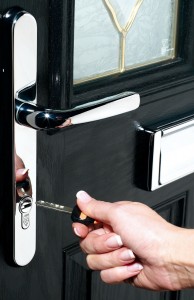 The average Briton moves home eight times in their lifetime
The average Briton moves home eight times in their lifetime- 11 per cent of the UK population moves home every year
- 92 per cent of domestic burglary in England and Wales is committed through either the front or back door
- Two thirds of Neighbourhood and Home Watch Network (NHWN) members do not change their locks when they move
“How many people could have a key to your new front door?”Jim Maddan, chairman, NHWN
Research undertaken by Neighbourhood and Home Watch Network (NHWN) has highlighted a gaping home security hole amongst its members – a problem the nationwide organisation says will be exacerbated amongst the general public.
Working alongside its primary security sponsor, Avocet Hardware, NHWN’s research found that two thirds of the 6,000 respondents do not change their locks when they move home. And of those two thirds, 86.2 per cent don’t even consider it.
 Jim Maddan, chairman of NHWN, said: “These figures alone may not seem that surprising, but when you consider that around 11 per cent of the population moves home in the UK every year (1); and that the average Briton moves eight times in their lifetime (2); then it begs the question just how many people could have a key to your new front door?”
Jim Maddan, chairman of NHWN, said: “These figures alone may not seem that surprising, but when you consider that around 11 per cent of the population moves home in the UK every year (1); and that the average Briton moves eight times in their lifetime (2); then it begs the question just how many people could have a key to your new front door?”
“And when you take into account the most recent Office for National Statistics (ONS) crime survey showed that 92 per cent of all domestic burglary in a dwelling in England and Wales was committed through either the front or back door (3), then it’s obvious that everything possible should be being done to secure them.”
The security lapse highlighted by the research not only means that two-thirds of NHWN’s members are putting themselves and their possessions in unnecessary danger when they move, but they are also running the very real risk of having their home insurance negated should a burglar simply unlock their front door and let themselves in.
Clive Lloyd, managing director of Avocet Hardware, said: “Whenever I move home I make sure I change my locks as quickly as possible – the reason being the sheer number of people who’ve had access to my door keys in previous homes.”
“Whether it’s friends or neighbours we’ve given spare keys to while we’re away on holiday; workmen we’ve left a key out for; or even our grown-up children who still have their own sets of keys; there’s no escaping the fact a lot of people could still have the key to my old front door when I move. Therefore, I assume everyone else is in exactly the same boat and so change my locks as soon as I move.”
Close to 40 per cent of those who told NHWN that they do change their locks when they move did so for the same reason as Clive, while a further 25 per cent made the decision based on the fact they felt the locks looked inadequate.
Meanwhile, only 6.9 per cent of people changed locks in order to upgrade to anti-snap locks – an extraordinarily low figure when you consider that over half of those polled had uPVC doors, the standard locks for which led to the development of lock-snapping as a means of forced entry in the first place.
“Doors are very much the main entry point for burglars and this research shows that a large percentage of the population isn’t even doing the basics to protect themselves,” continued Jim Maddan.
“Our advice is simple – change your locks as soon as you move and rule out at least one horribly easy route into your home.”
Neighbourhood & Home Watch Network is a voluntary network of schemes where neighbours come together, along with the police and local partners, to build safe and friendly communities. To find out more visit www.ourwatch.org.uk
For more information about Avocet Hardware and its snap secure locks visit www.abs-secure.co.uk
